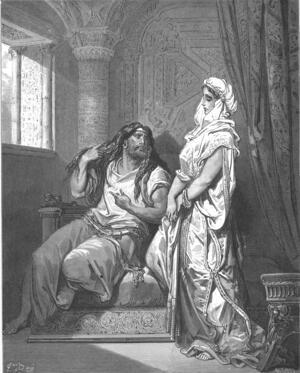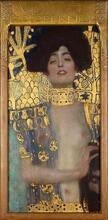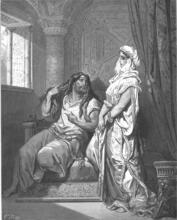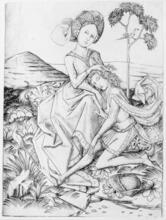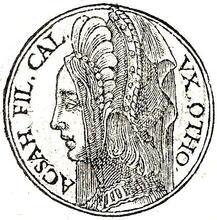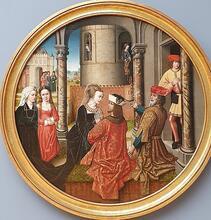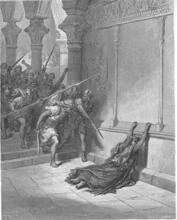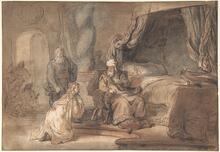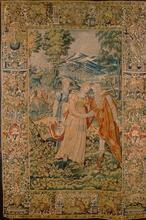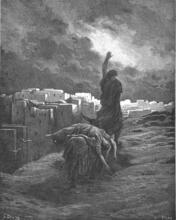Delilah: Midrash and Aggadah
In the Bible, Delilah tricked Samson, entering into a relationship with him in order to deliver him to the Philistines. The rabbis accentuated the negative aspects of the relationship between Samson and Delilah, attesting to their prejudice against non-Jewish women. The rabbis describe Delilah as robbing Samson of his masculinity, strength, intellect, and religion, and also explore how she robbed him of his intended path in life, that of a Nazirite. Later aggadot also state that Samson and Delilah had children who, like Samson, were zealous warriors.
Delilah: The Foreign Woman
The A type of non-halakhic literary activitiy of the Rabbis for interpreting non-legal material according to special principles of interpretation (hermeneutical rules).midrashim on Delilah attest to the negative attitude of the Rabbis toward non-Jewish women. The Biblical Delilah was not loyal to Samson and her relationship with him was for the sole purpose of delivering him to the Philistines. The Rabbis accentuated the negative aspects of the relations between Samson and Delilah in order to demonstrate the havoc that a foreign woman could wreak.
According to the Rabbis, the place name mentioned in the Biblical depiction of Samson’s relationship with Delilah (Jud. 16:4)—“he fell in love with a woman in the Wadi Sorek”—indicates the futility of this relationship, like an ilan serak, a tree that does not bear fruit (Num. Rabbah 9:24).
The Rabbis observe that even if Delilah had not borne this name, it still would have been appropriate for her, since she diminished (dildelah) Samson in different ways. She physically weakened him, as Jud. 16:19 relates: “and she had him cut off the seven locks of his head; thus she weakened him.” She caused him to lower his mental defenses: “for he has confided everything in me” (Jud. 16:18); she diminished his actions, for the Divine Presence left him (BT Suspected adulteressSotah 9b). In this manner the Rabbis seek to show that Delilah harmed Samson in three realms that are central to any male, and especially to Samson: physical strength, intellect, and religious beliefs. By falling in love with Delilah, Samson lost his strength, his independence as a man, and his spiritual fortitude. It was not the shearing of his locks that caused the Lord to leave him, but his forging a bond with this foreign woman.
Delilah was responsible for Samson abrogating his Nazirite restrictions, which his mother had been careful to observe from his conception. The Rabbis assert that when the angel informed Samson’s mother of the impending birth, he knew that, because of Delilah, Samson would not remain a Nazirite until his dying day, but the mother was unaware of this. Consequently, when she repeated the angel’s words to her husband, telling him “for the boy is to be a Nazirite to God from the womb,” she added, on her own, “to the day of his death” (Num. Rabbah 10:5; cf. vv. 5 and 7 in Jud. 13). This midrashic source stresses that Delilah diverted Samson from his purpose in life, at least as this was understood by his parents.
According to the Rabbinic account, Delilah used every possible wile to have Samson reveal to her the source of his strength. After he lied to her three times, she harassed him not only verbally but also physically, during intercourse with him. The Rabbis learn this from the wording “she pressed him” (Jud. 16:16); and they find an allusion to this in Jacob’s blessing to the tribe of Dan (Samson’s tribe) in Gen. 49:17: “a viper by the path [orah]”—because of the “orah of women,” the actions of a sly woman, he revealed his secret to her. In this manner Delilah forced Samson to tell her of his Nazirite status.
Samson was careful not to take God’s name in vain; accordingly, when he told Delilah “for I have been a Nazirite to God since I was in my mother’s womb” (Jud. 16:17), she understood that this time he told her the truth, and was not lying as he had before (BT Sotah 9b; Gen. Rabbati, Vayehi, p. 245).
Samson and Delilah’s Children
The late Statements that are not Scripturally dependent and that pertain to ethics, traditions and actions of the Rabbis; the non-legal (non-halakhic) material of the Talmud.aggadah relates that Samson and Delilah did, in fact, have children. Eldad ha-Dani claims that their offspring dwelt in the land of Havilah, “where the gold is” (see Gen. 2:11). Mighty men like their father, they were the first to enter the fray in the war with the kings of Cush. The smallest of them would pursue many, and each one, whose triumphal voice was as a lion’s roar, would loudly call out: “Salvation is the Lord’s, may Your might be for your people, the tribes of Jeshurun, Sela” (Eldad ha-Dani, in Ozar ha-Midrashim [Eisenstein], p. 20).

